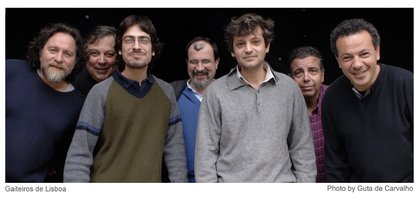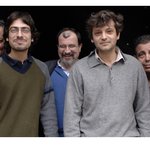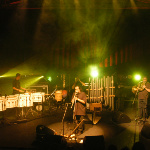- country:Portugal
- region:Lisboa
- style(s):Traditional
- label:Sony Music Entertainment
- type:Band
- gender:male
- instrumentation:instrumental, vocal
- artist posted by:Gaiteiros de Lisboa
Line up
- Carlos Guerreiro (vocals, hurdy-gurdy, panflutes, tubaros de Orfeu, )
- José Manuel David (vocals, bagpipe, flutes, percussion, tube,...)
- José Salgueiro (Percussions, trompet, vocals)
- Paulo Marinho (bagpipe, pan flutes, back vocals)
- Pedro Calado (Percussion)
- Pedro Casaes (vocals, percussion)
- Rui Vaz (vocals, bagpipe, ocarina, panflutes, percussion)
Links
Gaiteiros de Lisboa is a folk-traditional-world band of multi-talented musicians who got together around a sonorous project that builds on a continuous search for new sounds. This has leaded the group to the creation of original instruments. Basing its work upon the combination of the sound of different wind instruments and vocal polyphonies, the band plays songs and tunes from the various Portuguese traditions as well as from other cultures, and own compositions. Their experimental attitude sets up a bridge between tradition and modernity, by blending traditional styles with contemporary sensibilities.
Gaiteiros de Lisboa originally started out in 1991 as a street animation group. After several changes, it is presently formed by Carlos Guerreiro, Jose Manuel David, Jose Salgueiro, Paulo Marinho, Pedro Casaes, Rui Vaz, and Pedro Calado.
Musicians who have a long track record in very different genders, such as rock, jazz, pop, folk, classical and ancient music. They have played with the most important Portuguese musicians and bands, such as Jose Afonso, Sergio Godinho, Vitorino, Amelia Muge, Carlos Barretto, Rui Veloso, Setima Legiao and Adufe.
After the international presentation of the album 'Macareu', Gaiteiros de Lisboa was nominated for the World Music Awards 2003 of the BBC Radio, in the "Audience" category, alongside with Manu Chao, Madredeus, Mariza, Susana Baca ou Gotan Project.
Why "Gaiteiros de Lisboa"? ("Lisbon bagpipers")
Maybe because there are no bagpipers in Lisbon, or perhaps yes. Maybe because in Portuguese the word gaita has many different meanings. Our bag-pipes are everything we grab in the search for a sound, reinventing hurdy-gurdies, finding harmonies which were until now unknown to our throats, stretching animals' skin, trying to make percussion out of whatever others step on, untuning bag-pipes and tuning tubes for electrical installation. We worship the bagpiper of Tras-os-Montes (Portugal), who spent his life playing and drinking, while others would take care of his land estate (good old times). We worship all the virtuous bagpipers from Galicia, Scotland and Ireland and others who, despite the agitation of now-a-days life, bring the bagpipe back to its habitat: social intercourse. We regard them as the saints on a musical altar, knowing, nevertheless, that our own course will never take us to that kind of saintly. In the search for something in common among all the members of the group, we discovered that all of us had experiences in the field of musical animation.
Maybe therefore this incessant search for the novelty and for demonstrating, not what music is, but what it could be if each one of us would think of it in a creative way. The day will come, for us not to be surprised, to find out that the best percussion to go with the melody we like so much is ... the kitchen table. This is where we can find our link to traditional music. The trips around the country, recording and listening to voices and instruments (we don't dare to call it gatherings). We have learned that in some rural societies, music used to be something more than just pressing the button on the mini music-set bought at the supermarket. If we think of the pine-fruits, the bottle and fork, the guitars made of old olive-oil cans, our instruments don't seem that bizarre. Joining all these experiences, we came to the point where we felt able to create and not to copy. Urban as we are, we realised that the deeper our knowledge of melodies and traditional rhythms is, the more modern and original they sound to us. Sometimes we call this constant search for new ideas, this irreverence and quantity of information our music contains per time unity, in question. Some may say that in some themes, we passed over an idea that they could have been better, explored. These are the risks for the ones who have music as a whole, as their horizon and have been for a long time searching for the unknown.




